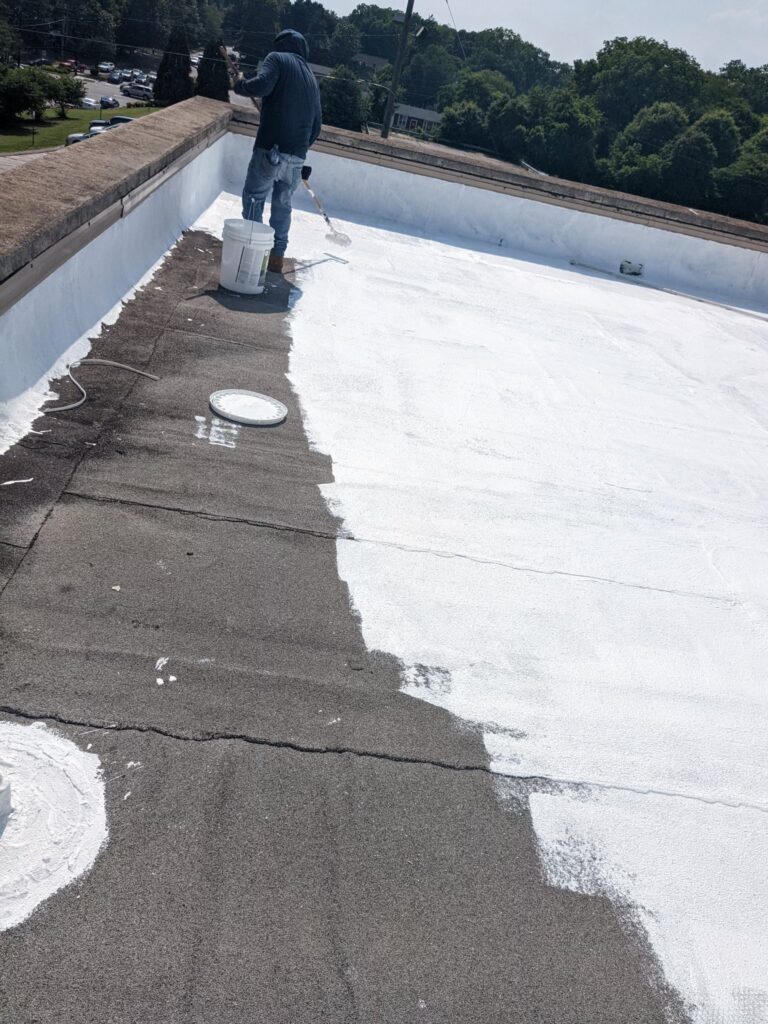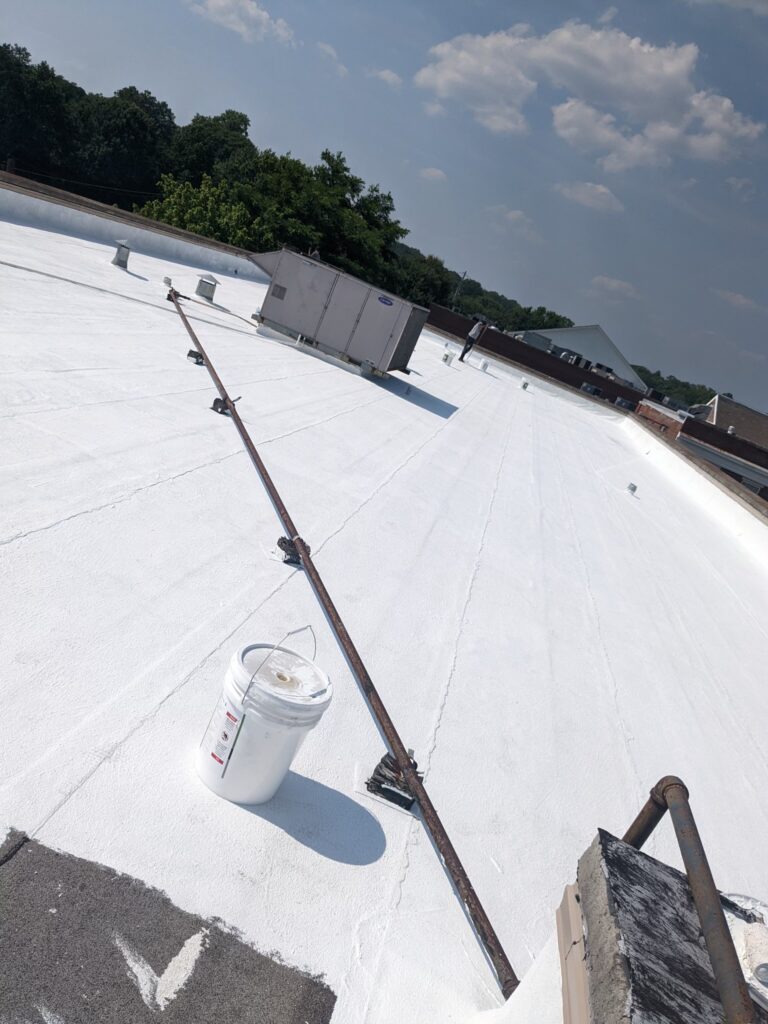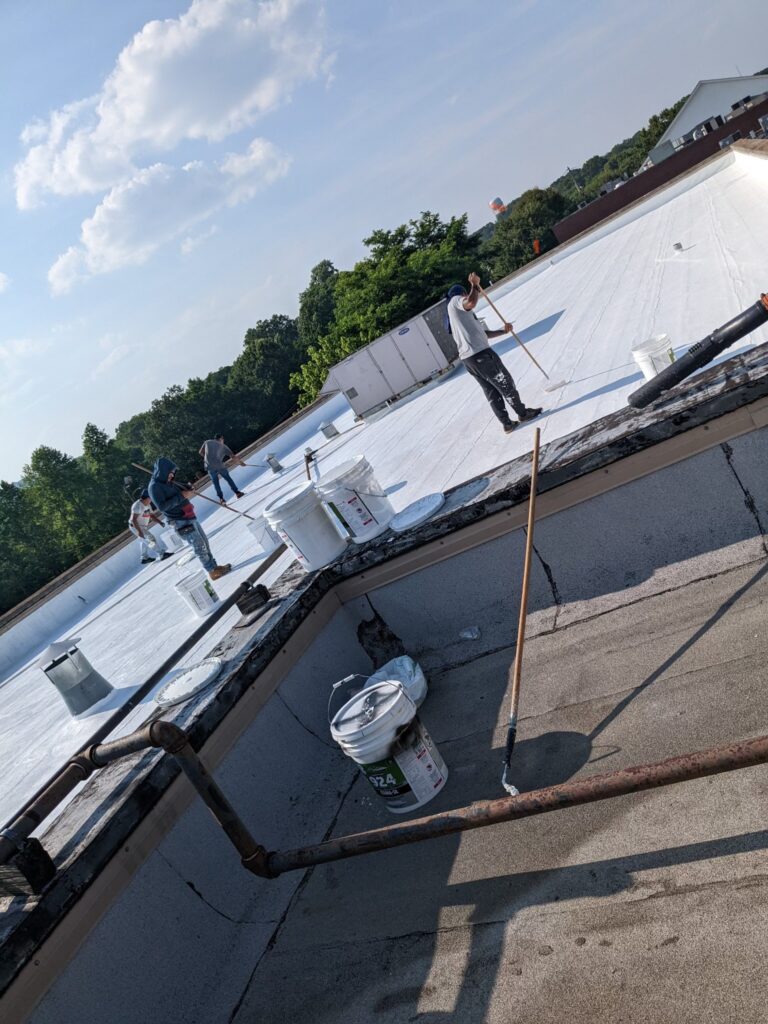Silicone roof coatings are perhaps the most popular chemistry type in the roof restoration industry. They make a great solution to restore and protect a wide variety of commercial roofing substrates including metal, modified bitumen, single-ply, EPDM, TPO, built-up roofs, concrete roof decks, and spray polyurethane foam. Silicone roof coatings are known for their durability and longevity. When properly applied and maintained, silicone coatings can last anywhere from 10 to 20 years or even longer. If you or someone you know may be in need of a professional silicone roof coating, be sure to contact Classic Roofing for a free quote today! Continue reading for the pros and cons of choosing to go with a silicone roof coating.
The quality of a silicone roof coating is crucial to the lifespan of the coating itself and its effectiveness in protecting the underlying roof substrate. Silicones are formulated with superior materials and additives that enhance their durability and resistance to various environmental factors. They can withstand exposure to UV radiation, extreme temperatures, moisture, and chemicals without degrading or deteriorating quickly. Inferior quality coatings may be prone to cracking, peeling, or becoming brittle, compromising their ability to provide long-term protection. Below, we will explain some of the key strengths and weaknesses of deciding to go with a silicone roof coating.
Pros of A Silicone Roof Coating
Ponding Water Resistance:
Perhaps the best benefit of a silicone roof coating is its resistance to ponding water. Silicone coatings can endure the damaging effects of ponding water without breaking down because they’re a moisture-cure substance, meaning they will not absorb any additional water after curing.
UV Protection:
Silicone roof coatings can reflect up to 80-90% of the sun’s harmful UV rays. This means facility managers and property owners can save thousands of dollars by cutting their facility’s cooling costs during the warm summer months and reducing the HVAC system workloads. Unlike other chemistries, a silicone coating won’t degrade, chalk, or crack from prolonged exposure to direct sunlight. They erode much slower than other coatings without becoming too brittle or hard.
High Solids Content:
Most modern silicone coating formulations have a high-solids content that typically exceeds 90%. This means less coating material is needed during application to achieve the desired dry mil thickness. The ability to apply more coating in a single pass helps save on time and labor costs without compromising workmanship and system integrity.
Environmentally Safe:
While all silicone coatings are considered to be environmentally friendly, high-solids formulations, specifically, are the best in this regard. Most of today’s high-solids silicone coatings are solvent-free and contain extremely low volatile organic compounds. Most also meet all state-regulated material safety standards, meaning they are safe for use in all 50 states.
Cons of A Silicone Roof Coating
Attracts Dirt:
Silicone coatings easily attract dirt and other airborne dust particles. Over time, this accumulation of dirt and dust on the roof surface causes the system to slowly lose its reflective properties. This gradual build-up makes the roof more susceptible to heat from the sun, which negatively impacts cooling costs and internal building temperatures. We recommend pressure washing a silicone coating system 6-12 months after it’s been installed to remove any dirt accumulation. This typically eliminates the problem of dirt accumulation altogether.
Challenging to Spray:
As with any solvent-based coating, silicone roof coatings can be difficult on hydraulic spray equipment. If the application equipment is not properly cleaned and maintained, problems during the installation process are more likely to occur.
Slippery When Wet:
Silicone coatings make surfaces very slippery, especially with weather factors such as rain.
When it comes to the suitability and performance of a roof coating, it’s important to understand the strengths and weaknesses of the chemistry. Silicone roof coatings are a highly effective roofing solution. There’s a number of key factors to consider when it comes to choosing the best silicone roof coating system for a commercial roofing environment. If you’ve decided to choose to go ahead with a silicone roof coating, contact Classic Roofing to have the job done quickly and easy for any building owner. Call today!
Have questions? Call Classic Roofing & Gutters at 770-424-2010
or email us at info@classicroofing.com
Silicone Roof Coating
Deprecated: File Theme without footer.php is deprecated since version 3.0.0 with no alternative available. Please include a footer.php template in your theme. in /var/www/wp-includes/functions.php on line 6121
Classic Roofing & Gutters is proudly powered by WordPress


